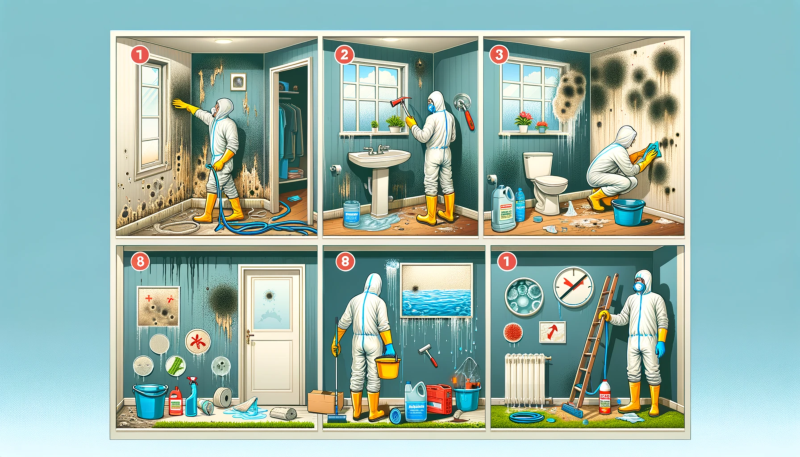Flies buzzing around your home can be a major annoyance and a health hazard. Not only are they pesky, but they also carry bacteria and diseases that can contaminate your food and living spaces. Fortunately, there are several effective methods to create a fly-free zone in your home.
1. Keep it clean and tidy: Flies are attracted to dirty and cluttered environments, so it's crucial to maintain a clean and tidy living space. Regularly vacuum, sweep, and mop your floors to eliminate any food particles or spills that may attract flies. Additionally, make sure to keep your kitchen counters, sinks, and garbage cans clean and free of any food residue.
2. Seal up entry points: Flies can easily enter your home through small cracks and gaps in windows, doors, and screens. Inspect your home for any potential entry points and seal them up with caulk or weatherstripping. Installing screens on windows and doors can also help keep flies out while still allowing fresh air to flow in.
3. Remove potential breeding grounds: Flies reproduce quickly, so it's essential to eliminate any potential breeding grounds in and around your home. Regularly empty and clean your garbage cans, as well as any pet waste or litter boxes. Keep your outdoor areas clean and free of rotting fruits, vegetables, and other organic matter that can attract flies.
4. Use fly traps and repellents: Fly traps and repellents can be effective in reducing the fly population in your home. There are various types of fly traps available, including sticky traps, baited traps, and electric traps. Additionally, you can use natural fly repellents such as essential oils, vinegar, or herbs like basil and mint to deter flies from entering your living spaces.
5. Seek professional help: If you have a severe fly infestation that persists despite your best efforts, it may be time to seek professional help. Pest control companies have the expertise and resources to effectively eliminate flies from your home using safe and environmentally-friendly methods.
By implementing these essential tips, you can create a fly-free zone in your home and enjoy a clean and pest-free living environment.
Understanding the Fly Problem: Why Flies Enter Houses
Flies are a common nuisance in homes, and understanding why they enter houses can help in effectively preventing and eliminating them. Here are some reasons why flies are attracted to houses:
- Food: Flies are attracted to food sources, especially those that are sweet or have a strong odor. They can be found hovering around garbage cans, unwashed dishes, and uncovered food items.
- Water: Flies need water to survive, and they are often attracted to areas with moisture. This includes leaky pipes, standing water, and damp areas in the house.
- Warmth: Flies are more active in warm temperatures and seek shelter in houses during colder seasons. They can enter through open doors or windows, cracks, and gaps in the walls.
- Breeding: Flies reproduce quickly, and houses provide them with suitable breeding grounds. They lay their eggs in decaying organic matter such as rotting food, animal waste, and compost piles.
- Light: Flies are attracted to light and may enter houses through open windows or doors that have bright lights. They are particularly drawn to ultraviolet light.
By understanding these reasons, you can take proactive measures to prevent flies from entering your home. This includes proper food storage, regular cleaning, sealing cracks and gaps, fixing leaks, and using fly screens on windows and doors.
Why are flies suddenly coming in my house?
Dealing with flies can be quite frustrating, especially when they seem to appear out of nowhere in your house. Understanding why flies are suddenly coming into your home can help you take the necessary steps to prevent their entry and keep your living space fly-free.
There are several reasons why flies may suddenly start invading your house:
1. Open doors and windows: Flies are opportunistic insects and can easily enter your home through open doors and windows. They are attracted to the smell of food and can quickly find their way inside if you leave these entry points unprotected.
2. Food sources: Flies are attracted to decaying organic matter, such as garbage, rotting fruits, or pet waste. If you have any of these food sources in or around your house, flies may be drawn to them and find their way inside.
3. Poor sanitation: Flies thrive in dirty and unsanitary environments. If your house is not properly cleaned and maintained, it can create an ideal breeding ground for flies. Regular cleaning and proper waste management can help deter flies from entering your home.
how to clean oven
4. Nearby infestations: Flies can be attracted to neighboring properties or areas with heavy fly populations. If your neighbors are dealing with a fly infestation or if there are nearby sources of flies, they may migrate to your house in search of food or breeding sites.
5. Warm weather: Flies are more active during warm weather and may become more prevalent in your house during the summer months. As the temperature rises, flies reproduce at a faster rate and are more likely to seek shelter in cool indoor spaces.
To prevent flies from coming into your house, it is important to eliminate their food sources, seal any gaps or cracks in doors and windows, maintain proper sanitation, and consider using fly screens or traps. By taking these measures, you can create a fly-free zone in your home and enjoy a pest-free living environment.
brat internal temp
Fruit flies are particularly attracted to ripe or rotting fruit. To make a fruit and soap fly trap, place a piece of ripe fruit, such as a banana or apple, in a bowl. Add a few drops of liquid dish soap and mix it with water. Flies will be attracted to the fruit and soap mixture and will drown in the water.
Herbs and Essential Oils:
Flies dislike the strong scent of certain herbs and essential oils. You can use these scents to repel flies from your home. Some effective options include lavender, eucalyptus, peppermint, and citronella. Place dried herbs or a few drops of essential oil on a cotton ball and place it in areas where flies are common.
Remember, while these DIY fly traps and home remedies can help reduce the fly population in your home, it's also important to address the root cause of the infestation. Keep your home clean, dispose of food waste properly, and seal any potential entry points to prevent flies from entering in the first place.
What is the best homemade trap for flies?
When it comes to dealing with pesky flies in your home, a homemade trap can be an effective and affordable solution. Here are a few simple yet effective homemade traps that you can try:
- Vinegar and Dish Soap Trap: Fill a shallow dish with apple cider vinegar and add a few drops of dish soap. The smell of vinegar will attract the flies, and the dish soap will break the surface tension, causing them to drown.
- Wine Trap: Pour some leftover wine into a glass and cover it with plastic wrap. Secure the plastic wrap with a rubber band and poke small holes in it. Flies will be attracted to the scent of the wine and will enter through the holes, but they won't be able to find their way out.
- Fruit Trap: Cut up a piece of ripe fruit and place it in a jar or bowl. Cover the top with plastic wrap and poke small holes in it. Flies will be lured by the sweet smell of the fruit and will enter through the holes, only to become trapped inside.
- Soda Bottle Trap: Cut the top off a plastic soda bottle and invert it into the bottom half. Secure it with tape. Pour a mixture of sugar water, vinegar, and a few drops of dish soap into the bottom half. The flies will be attracted to the mixture and will enter the trap but won't be able to find their way out.
Remember, these homemade traps are most effective when placed in areas where flies are commonly found, such as near trash cans or in the kitchen. Additionally, it's important to regularly empty and clean the traps to prevent them from becoming breeding grounds for more flies.
Quick Solutions for Killing Indoor Flies
Dealing with indoor flies can be a frustrating experience. Fortunately, there are several quick solutions that can help you eliminate these pesky pests. Here are some effective methods to get rid of indoor flies:
- Fly swatter: One of the simplest and most effective ways to kill indoor flies is by using a fly swatter. Swatting the flies as soon as you spot them can quickly reduce their numbers.
- Fly paper: Hanging sticky fly paper in areas where flies are commonly found can attract and trap them. This can be a cost-effective solution, especially for larger infestations.
- Fly traps: There are various types of fly traps available on the market, including sticky traps and baited traps. These traps use attractants to lure flies and then capture them. They can be placed strategically around your home to effectively kill indoor flies.
- Homemade traps: If you prefer a DIY approach, you can make your own fly traps using common household items. One popular method is to create a trap using a plastic bottle filled with a mixture of sugar water and vinegar. Flies are attracted to the sweet scent and get trapped inside the bottle.
- Electric fly swatters: Electric fly swatters are handheld devices that electrocute flies upon contact. They are a convenient and quick solution for killing indoor flies. However, caution should be exercised while using them to avoid accidental contact with humans or pets.
- Chemical sprays: In cases of severe fly infestations, chemical sprays can be used as a last resort. These sprays contain insecticides that kill flies on contact. Make sure to read and follow the instructions carefully to ensure safe and effective use.
Remember to keep your home clean and free of food sources that attract flies. Regularly empty trash cans, clean up spills, and keep food items properly stored. By implementing these quick solutions and maintaining good hygiene practices, you can effectively eliminate indoor flies from your living space.
What is the fastest way to kill house flies?
House flies can be a major nuisance, buzzing around your home and spreading bacteria. If you're looking for the fastest way to eliminate these pesky insects, here are some effective methods:
| 1. Fly swatter | Using a fly swatter is a traditional and effective way to kill house flies. Simply swat the flies when they land on surfaces or are flying around. It requires quick reflexes, but it's a low-cost and immediate solution. |
| 2. Fly tape or fly paper | Fly tape or fly paper is another popular method to catch and kill house flies. These sticky strips are coated with a substance that attracts flies, causing them to get stuck and eventually die. Hang the tape or paper in areas where flies are most active. |
| 3. Electric fly swatter | An electric fly swatter is a modern alternative to the traditional swatter. It is battery-powered and features an electric grid that kills flies upon contact. This method is effective and allows you to kill flies with a single swipe. |
| 4. Fly traps | There are various types of fly traps available, such as baited traps or UV light traps. These traps attract flies and then capture them, preventing them from flying around your home. Some traps use a combination of attractants to lure flies. |
| 5. Insecticides | If you have a severe fly infestation, you may consider using insecticides. These products are designed to kill flies and other insects on contact. Follow the instructions carefully and use them in areas where flies are most prevalent. |
Remember to keep your home clean and eliminate any potential sources of food or breeding grounds for flies. Regularly empty trash cans, clean up spills, and keep doors and windows screened to prevent flies from entering your home in the first place.
By employing these methods and maintaining good hygiene practices, you can quickly and effectively kill house flies and create a fly-free zone in your home.
What is the best product to kill flies indoors?
When it comes to dealing with flies indoors, there are several effective products available on the market that can help you eliminate these pesky insects. Here are some of the best options:
- Fly swatter: A classic and cost-effective solution, a fly swatter allows you to manually kill flies by swatting them. It requires some skill and patience, but it can be an effective method if you have good reflexes.
- Fly paper: Fly paper is a sticky trap that attracts flies and catches them when they land on it. It is easy to use and can be placed in areas where flies are commonly found, such as near windows or garbage cans.
- Fly trap: There are various types of fly traps available, including baited traps and light traps. Baited traps use attractants to lure flies and then trap them, while light traps use ultraviolet light to attract and kill flies. These traps can be placed in areas where flies are a problem, such as kitchens or dining areas.
- Fly spray: Fly sprays are insecticides that can be sprayed directly on flies to kill them. They are quick and easy to use, but make sure to follow the instructions carefully and use them in well-ventilated areas.
- Electric fly killer: Electric fly killers, also known as bug zappers, use ultraviolet light to attract flies and then electrocute them. They can be hung or placed on a flat surface and are suitable for both indoor and outdoor use.
When choosing a product to kill flies indoors, consider factors such as effectiveness, ease of use, and safety. It's also important to follow the instructions provided with the product to ensure optimal results and minimize any potential risks. Remember to keep your living space clean and take preventive measures to reduce the presence of flies indoors.
Q&A:
What are some natural ways to get rid of indoor flies?
There are several natural ways to eliminate indoor flies. One method is to create fly traps using a mixture of apple cider vinegar and dish soap. Another option is to place basil plants or dried bay leaves around the house, as flies are repelled by their strong scent. Additionally, keeping the house clean and free of food debris can help prevent flies from being attracted to the space.
how long to thaw a turkey
Is it possible to prevent flies from entering the house?
While it may be difficult to completely prevent flies from entering the house, there are steps you can take to minimize their presence. One way is to install screens on doors and windows to create a barrier. It is also important to keep doors and windows closed as much as possible, especially during peak fly season. Additionally, sealing any cracks or openings in the house can help prevent flies from finding their way inside.
Are there any chemical sprays that can effectively eliminate flies?
Yes, there are chemical sprays available on the market that can effectively eliminate flies. These sprays typically contain insecticides that are specifically designed to target flies. It is important to carefully read and follow the instructions on the product label to ensure safe and effective use. It is also recommended to use these sprays in conjunction with other preventive measures, such as keeping the house clean and sealing any potential entry points for flies.
Can flies be harmful to human health?
Flies can potentially be harmful to human health as they are known to carry and spread diseases. Some common diseases that can be transmitted by flies include salmonellosis, cholera, and typhoid fever. Flies can pick up pathogens from various sources, such as garbage or animal waste, and then transfer them to surfaces or food. Therefore, it is important to take steps to eliminate flies and prevent their presence in indoor spaces.
How often should fly traps be cleaned?
It is recommended to clean fly traps regularly, ideally every few days or as needed. This is important to prevent the buildup of dead flies and other debris, which can attract more flies and create an unsanitary environment. Cleaning the fly traps typically involves emptying the contents into a trash bag, rinsing the trap with water, and refilling it with fresh bait. Following the manufacturer's instructions for the specific fly trap being used is also advisable.
What are some natural ways to get rid of flies indoors?
There are several natural ways to get rid of flies indoors. One method is to create a homemade fly trap using a mixture of apple cider vinegar and dish soap. Another option is to use essential oils like lavender, eucalyptus, or peppermint, as flies are repelled by these scents. Additionally, keeping the house clean and free of food debris can help reduce the presence of flies.
Are there any specific plants that can help repel flies indoors?
Yes, there are specific plants that can help repel flies indoors. Some examples include basil, lavender, mint, and marigold. These plants contain natural compounds that repel flies and can be placed near windows or other areas where flies tend to enter the house.




